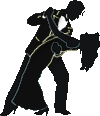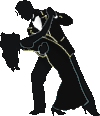
Ballroom Dance
J M (Mike) Nelson
Email:jmnelson@cloudnet.com
Phone: 612-810-0157

| jmnelson.com | Dance Home Page | Dance Curriculum | Dance Articles |
 |
Ballroom DanceJ M (Mike) Nelson |
 |
Things They Don't Tell You in Dance ClassStudent anxiety and frustration are the major causes of failure in learning to dance. This article is to help increase learning for the beginning dance student in a traditional dance class, where most students feel inadequate, frustrated, and overwhelmed. Teachers know that, but little is done either to acknowledge it, explain it, or alleviate it. Dance teachers simply end up repeating the injustices that were done to them, as though they had no other choices. The following are to help you better understand your discomfort. The good news, learning to dance isn't all that difficult after you get the hang of it, so "hang in there." You Will Be Overwhelmed. The typical dance class will have a dozen, and perhaps more than twenty, important pieces of information. The capacity of human short term memory ranges from five to nine pieces of information; most of us feel memory overload at seven. This has been confirmed at all levels of learning. Don't feel bad because you aren't able to remember all that is required. No one can, and if you think some do, they are probably repeats. Why dance teachers have continued for decades to present more than the student can master is as perplexing as it is irrational, but they do. Furthermore, dance teachers rarely provide even a course outline, much less detailed explanations of terms. Ask your teacher for the seven most important things to remember, hope that they know what to tell you, and take notes. You Will Be Frustrated. Research shows that to retain new psychomotor skills, you must practice past the point of proficiency. Dance teachers should know this, but apparently they don't. Here is the typical sequence for learning a new motor skill, note that both the first few items, and the last, take place inside our brain: confusion, planning, sequencing, replication, proficiency, and, finally, retention. Most dance teachers move on soon after they observe replication. This precludes learning. Don't feel alone; others are feeling the same way. Perhaps that is by design so that you will take more classes. Drag down the class with insistence on more practice. Don't complain if the class goes slowly. Take advantage of the opportunity to practice. That way you might learn something. Practice as soon as possible after class, and you might retain something. Listen to the how and disregard the what. Dance teachers exacerbate memory overload with prescriptive sequences. This triple threat clogs memory with trivia, crowds out important information, and denies you opportunity to make decisions on your own, the latter important in improving psychomotor learning. When a teacher prescribes a sequence of variations, disregard it, try to remember the variations you have learned, and implement them at your discretion. This greatly increases the likelihood that you will retain some of the information covered in class. Teachers should know better. No area of psychology has been studied as systematically and as thoroughly as human learning. Psychologists know a great deal about human learning, and systematic instructional design has been a major force in industry and education since the mid 20th century. Unfortunately, none of this knowledge seems to have influenced the teaching of ballroom dance. Be prepared to repeat dance classes, unless, of course, you enroll in one of mine. Mine might be a bit less exciting, but you will not be overwhelmed, and you will not likely have to repeat a beginner class. Ever! 2008, J M Nelson |
| jmnelson.com | Dance Home Page | Dance Curriculum | Dance Articles |
Copyright (c) 2006, J. M. Nelson. All rights reserved. Reproduction of contents prohibited without prior permission from the author.